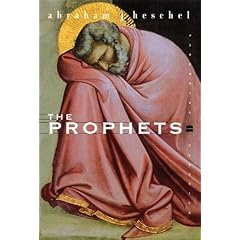One of my favorite quotes from Heschel is this one:
The ultimate object and theme of his consciousness is God, of whom the prophet knows that above his judgment and above his anger stands his mercy.
In other words, yes God gets angry. Yes, he judges. But greater than that, standing behind and above it, is his mercy and lovingkindness. In the prophets, judgment and hope are two sides of the same coin. When God threatens destruction, he inevitably comes around to the promise of restoration.
He utters judgment not in the cold manner of a jurist reading a sentence, but rather in the heart-broken tones of one who has been made a cuckold of again and again. We hear him say, not "5 to 10 hard labor", but "I've loved you from the beginning! Why do you turn away from me? Don't you know those other gods are no gods at all?!"
The prophets reveal not a God of wrath but a God of love (who has a very good reason to be angry). We see not the cold, abusive father, but the jilted husband, the one who trusted over and over, only to be made sport of by his adulterous bride. What's most remarkable about the prophets is not that God judged his people and sent them away into exile, but that he sent them thousands of messengers and gave them hundreds of years to turn back to him.
And you thought this "God is love" stuff started in the New Testament...


1 comment:
I think I would read that book. What's behind the name e4? Anyway, good post.
Post a Comment